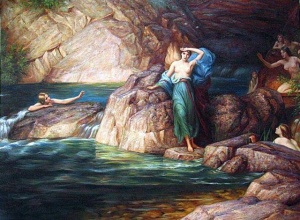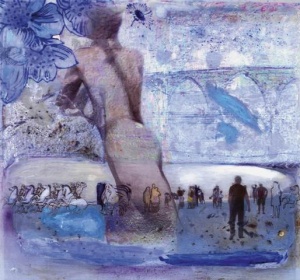Language/Modern-greek-1453/Culture/Alkyonides-days-in-Greek-Mythology
English
The “Oasis” of hot sunny days in the dead of winter, is known as the “Alkyonid Days” period. Their name comes from the mythical Alcyone,
daughter of the king of the winds Aeolus, who lived happily with her husband Kyikas, who, according to legend, would go fishing one day,
despite calls from Alcyone not to go and who did not never returned.
The ancient Greeks believed that the bird was once Alkyonis, the daughter of King Aiolos, whom Zeus transformed into a bird after her
suicide due to the death of her beloved, Kyikas. The love they felt for each other led them to compare themselves with the archetypal divine couple,
Zeus and Hera, and they were self-titled with those names, not theirs. The gods punished them, transforming Alkyone into the homonymous
fish-tailed seabird and Kyikas into a bird thrusting into the sea to grab its prey, perhaps a seagull. But because Alkyone made her nest close to the shore and the waves destroyed it, Zeus felt sorry for her and ordered the winds to stop for fourteen days, seven before the winter solstice and seven afterwards.
During these days, Alkyone incubates her eggs “or so the myth says”. These warm days without bad weather in January were since called “Alkyonides” days.
Français
L'Oasis des journées chaudes et ensoleillées en plein hiver, est connue sous le nom de période "Jours Alcyonides".
Leur nom vient du mythique Alcyone,dont les Anciens Grecs croyaient que l'oiseau était autrefois Alkyonis, la fille du roi Aiolos, que Zeus a transformé en oiseau après son suicide en raison de la mort de son bien-aimé époux, Kyikas. L'amour qu'ils ressentaient l'un à l'autre les a amenés à se comparer au couple divin archétypal, Zeus et Héra, et ils étaient éponymes avec ces noms, pas avec les leurs.
Les dieux les ont punis, transformant Alkyone en oiseau de mer homonyme à queue de poisson et Kyikas en un oiseau se jetant dans la mer pour attraper sa proie, peut-être une mouette. Mais parce qu'Alkyone a fait son nid près du rivage et que les vagues l'ont détruit, Zeus s'est senti désolé pour elle et a ordonné aux vents de s'arrêter pendant quatorze jours, sept avant le solstice d'hiver et sept après. Pendant ces jours, Alkyone incube ses œufs «du moins le mythe dit». Ces journées chaudes sans intempéries en janvier ont été appelées depuis jours «Alkyonides».
Αλκυονίδες Ημέρες
H «όαση» των ηλιόλουστων και θερμών ημερών, στην καρδιά του χειμώνα, είναι γνωστή ως η περίοδος των λεγόμενων " Αλκυονίδων Ημερών ".
Η ονομασία τους προέρχεται από τη μυθική Αλκυόνη, κόρη του βασιλιά των ανέμων Αίολου, που ζούσε ευτυχισμένη με τον σύζυγό της Κύηκα,
ο οποίος σύμφωνα με το μύθο μια μέρα πήγε για ψάρεμα, παρά τα παρακαλετά της Αλκυόνης να μην πάει και δεν γύρισε ποτέ.
Στο αρχαίο έργο «Αλκυών», που αποδίδεται στο Λουκιανό, η Αλκυόνη αναζητούσε για μέρες μάταια το πτώμα του με αποτέλεσμα οι θεοί να την λυπηθούν
και να τη μεταμορφώσουν στο ομώνυμο πουλί.
Σύμφωνα με άλλη εκδοχή του μύθου, η Αλκυόνη μόλις είδε το πλοίο του να βυθίζεται από τους δυνατούς ανέμους μέσα στην απελπισία της έπεσε
από ένα βράχο και σκοτώθηκε. Οι θεοί εντυπωσιασμένοι από την αγάπη τους, τους μεταμόρφωσαν στα ομώνυμα πουλιά.
Η Αλκυόνη γεννούσε τα αυγά της στην ακροθαλασσιά, όπου όμως τα νεογέννητα της παρασύρονταν και χάνονταν από τα κύματα.
Ο Δίας κάποτε τη λυπήθηκε και αποφάσισε να στέλνει κατά την εποχή που η Αλκυόνη επωάζει τα αυγά της ημέρες καλοκαιρίας
και διέταξε τον Αίολο να συγκρατεί αυτές τις ημέρες τους ανέμους.
Author
- Ευγενική χορηγία που στοχεύει να βοηθήσει μαθητές ή μη, απανταχού της Γης, που επιδίδονται στην εκμάθηση της ελληνικής γλώσσας!
- Contribution bénévole visant à aider les personnes, partout dans le monde, qui sont engagées dans l'apprentissage de la langue grecque !
- Voluntary contribution aimed at helping people, all over the world, who are committed to learning the Greek language!
Other Lessons
- Sapphô
- The Rapture of Europe
- Shield of Achilles
- Valentine’s day quotes
- Greek Proverbs
- Narcissism
- Moussaka
- Meaning of the word Periplus
- Narrative voice in Greek
- Alexithymia


